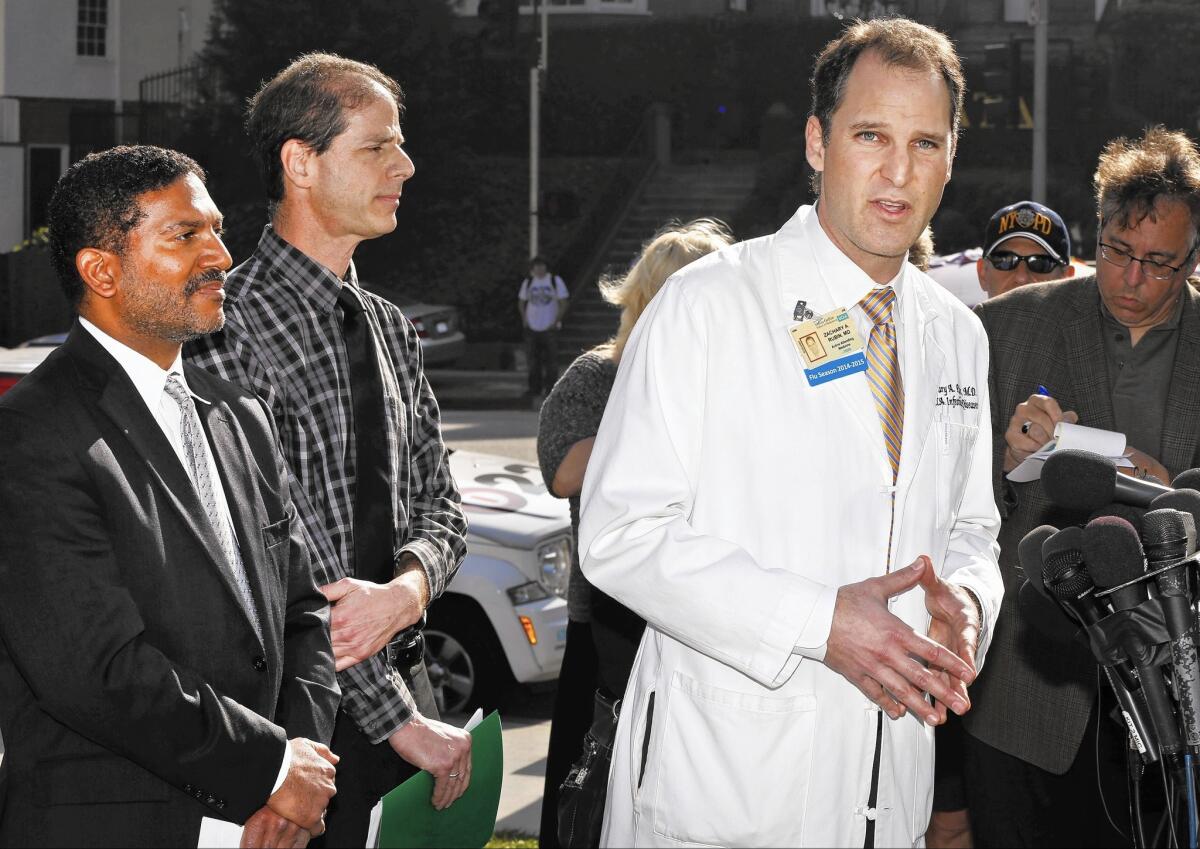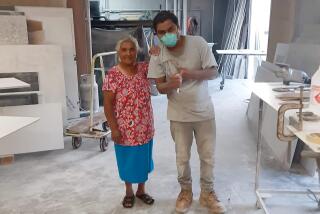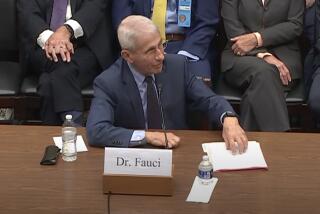Medical scopes linked to superbug remain a risk

- Share via
Reporting from SILVER SPRING, Md. — Patients across the nation continue to face considerable risk from medical scopes linked to deadly bacterial outbreaks due to basic design flaws and a lack of easy fixes, a federal panel was warned Thursday.
Testimony from physicians and researchers came as the Food and Drug Administration and Olympus Corp., a leading scope manufacturer, took a barrage of criticism for allowing this situation to unfold in hospital after hospital.
A day of highly technical presentations was punctuated by the tearful testimony from a North Carolina widow who lost her husband to a superbug infection. “His battle was more than I could bear to watch,” Carla Warner recalled.
She singled out the FDA and Olympus, saying “they have failed me, my family, and my husband paid the ultimate price with his life.”
In the first day of testimony before the FDA advisory committee, the agency defended its response to the outbreaks and reiterated that the benefits of these difficult-to-clean duodenoscopes continue to outweigh the risks of infection.
The committee is expected to hear Friday from more medical experts on cleaning alternatives and consider recommendations on how the FDA should respond to this issue.
Meanwhile, Olympus, which manufactured the scopes implicated in at least six outbreaks, refused to take on its critics and declined to participate in the FDA hearing.
The devices are used in a procedure called ERCP, or endoscopic retrograde cholangiopancreatography. About 670,000 ERCP procedures were performed in the U.S. last year.
The news of an outbreak at UCLA’s Ronald Reagan Medical Center in February raised alarms nationwide and prompted an FDA alert the next day.
A UCLA doctor testified about the incident Thursday and disclosed that another L.A. patient had died from the initial outbreak.
Dr. Zachary Rubin, director of clinical epidemiology and infection prevention at UCLA, said that eight patients had become infected with the CRE superbug from two contaminated scopes and three of them have died.
Both Rubin and a doctor from a Seattle hospital struck by a similar outbreak agreed that the problem of scope-related infections is bigger than what has been reported thus far. They both described the difficulty in detecting the infections even with sophisticated staff and considerable resources that many community hospitals would lack.
“If you don’t look for these infections,” Rubin said, “you won’t find them.”
The most gripping testimony came from Warner, an accountant from Statesville, N.C. She described how her husband had died at age 55 from a CRE infection that he got from a duodenoscope.
Bill Warner had three ERCP procedures from December 2012 to January 2013 at Carolinas Medical Center in Charlotte, N.C., she said. The hospital informed them in February 2013 that he had an infection.
Carla Warner said she watched her husband suffer, losing 60 pounds and fighting through intense pain. He died in November 2013.
Warner asked why it had taken federal regulators years to determine there was such a significant risk from the device.
Warner said she disagreed with the often repeated claim of the FDA and doctors that the benefits of ERCP far outweigh the low risk of infection. “For me and my family this comment is absurd,” she said.
Later in the hearing, FDA official Suzanne Schwartz paused before her scheduled presentation and turned back to the audience to thank Warner for sharing her experience.
“There’s no way I can even begin to understand and feel the pain and suffering you’ve had to endure as a result of your husband’s passing,” Schwartz said. “Our FDA team is committed to getting this right.”
A spokesman for Carolinas Medical Center in Charlotte, N.C., where Bill Warner was treated, declined to comment, citing patient privacy laws.
The three U.S. manufacturers of duodenoscopes — Olympus, Pentax Medical and Fujifilm — all declined to speak at the hearing.
Mark Miller, an Olympus spokesman who attended the meeting, said the company is continuing to talk directly with FDA officials. The company “will evaluate whether to provide written input” to the advisory panel after the hearing, he said..
Pentax said that patient safety is its “number one focus” and that it will continue to work with regulators to address any concerns. Fujifilm couldn’t be reached for comment.
Doctors testified that the scopes could transfer pathogens of all types to patients, but that outbreaks from CRE had been noticed because the bacteria is unusual and especially lethal.
“This is just the tip of the iceberg,” said Margreet Vos, a doctor from Erasmus University Medical Center in Rotterdam, which had an outbreak linked to an Olympus scope in early 2012.
Because of that outbreak in the Netherlands, Olympus in January 2013 sent a letter to European hospitals warning that its device was especially hard to clean. It did not send a similar warning in the U.S. until two years later.
Vos showed photos of the brown scaly deposits that investigators had found inside the Olympus device when they later dismantled it. The investigators had blamed the problem on an o-ring that was expected to seal the device’s elevator channel so that it could be more easily cleaned.
Dr. Stephen Ostroff, the FDA’s acting commissioner, said the goal of the meeting was to assure doctors and their patients that the scopes could be used safely.
“As we address the problem of duodenoscope-associated infections,” Ostroff said, “we have to do so in a manner that doesn’t disrupt medical care.
Twitter: @chadterhune
Twitter: @melodypetersen
Terhune reported from Silver Spring, Md., and Petersen from Los Angeles.
More to Read
Inside the business of entertainment
The Wide Shot brings you news, analysis and insights on everything from streaming wars to production — and what it all means for the future.
You may occasionally receive promotional content from the Los Angeles Times.












